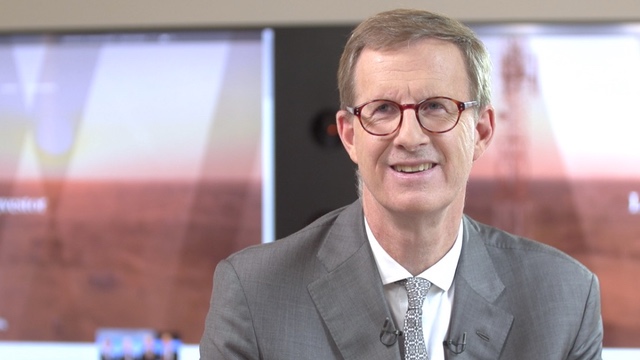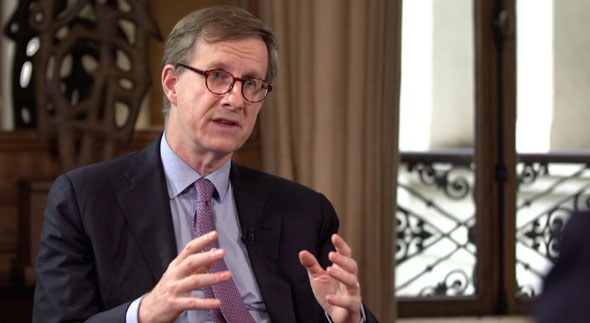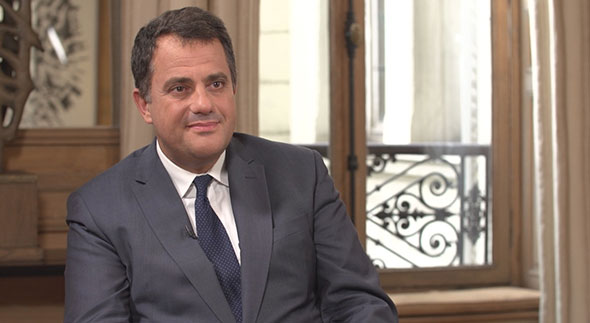EuroBusiness Media (EBM): Wendel, one of Europe’s leading listed investment firms reports results for the first half. Frédéric Lemoine, welcome. You are the Chairman of the Executive Board of Wendel. What are your highlights and key takeaways from this first half, which was particularly active in terms of news flow?
Frédéric Lemoine: That’s right. It has been a very active first half of the year. We are very satisfied because we have solved the financial problems of the past. Of course this has been a progressive process, but since the beginning of the year, in three steps, we have really solved the problems, and we are able to look ahead now.
First, we have completely paid back the debt that had been taken on at the time of the acquisition of our stake in Saint-Gobain. It was €5.6 billion in 2009 and is size since January 2014. The second step later in the year in May, we decided to adjust the level of our stake in Saint-Gobain precisely, to remain for the long term the main shareholder of Saint-Gobain, but enabling us to free up some funding for new investments. So we sold 24 million shares at €42 per share. We got back €1 billion at the time, and it directly led Standard & Poor’s to upgrade us to an Investment Grade rating, which was clearly one of our strategic goals. An investment firm like ours has to be Investment Grade, and we will keep this status moving forward.
And the third step was finalized during the summer, it relates to Materis. Materis is a very nice company that we have had since 2006, but it was much too much in debt, and on two different occasions we had to refinance the debt, in 2009 and 2012. One year ago, in August 2013, we announced that we would sell various divisions and various activities of Materis, which is what we did. The effective disposal of Kerneos in aluminates was closed in March 2014; the sale of the Parex group, the mortar division of Materis, was done at the end of June, and we announced during the summer that we entered into exclusivity with LBO France, a private equity group, to sell our admixture division Chryso, which should be done during the third quarter of 2014. So, from four different divisions—that had nothing to do with each other by the way—we reduced the scope of Materis to only one, the decorative paints, which we will keep and develop in the future. From a debt of €1.9 billion, we went down to a debt of less than €300 million with a very moderate debt ratio of four times EBITDA, which enables us to develop the group in the future, so it’s solved. We paid off the debt of Saint-Gobain, we were rated Investment Grade, and we solved the problems of Materis. I think that’s a good result.
EBM: The net asset value declined in the first half. Is this a matter for concern?
Frédéric Lemoine: No. The net asset value is at a reasonable level of €127 per share, a little bit more. I wish our share price were at the level of our net asset value, which is the best assessed value that we can deliver to the market, so our concern is more about the discount than about the net asset value itself. It declined a little bit because of the slowdown of the stock market during the summer, since obviously the value of our listed assets are based on their current share price, and the value of our non-listed assets is also linked with the share price of the listed comparables. However, it goes up and down, but the general trend is clearly of strong growth since the €28 per share of our net asset value at the end of 2008.
EBM: Bureau Veritas is an important stake in your portfolio. Is there anything to report there?
Frédéric Lemoine: Well, Bureau Veritas is really our jewel. We have been a shareholder in for Bureau Veritas for the last 20 years, and we see no reason why we should not stay very long in supporting the development of Bureau Veritas, because it’s creating value all of the time. There are new fields that Bureau Veritas enters by organic development or by acquisition. There have been seven acquisitions since the beginning of the year to develop in new geographic areas, like Bureau Veritas did in Canada with Maxxam—the leader of the testing, inspection, and certification market in Canada—but also in new niches that Bureau Veritas imagines and selects very carefully and very creatively. By the way, Forbes magazine very recently published the rankings of the top 100 innovative companies in the world, and Bureau Veritas is number 50 in these rankings, not only because of their ability to expand in new areas and new fields all of the time, which is part of the value of the group. This being said, we believe that the organic growth of Bureau Veritas is very important as well. It has been lower than it has been in the first half at 1.8%. Now it’s rebounding progressively—probably 3% for the total year in terms of organic growth. Including the external growth, the management said it will reach more than 9% for 2014, and it will probably be higher next year. We are also dependent on the state of various sectors that are not always very dynamic, like the minerals sector for instance, recently.
In terms of profitability, it’s very important to underline that Bureau Veritas is reaching a record level of profitability and plans to be at 17% operating margin next year in 2015, which is remarkable.
EBM: Coming back to Saint-Gobain for a moment, is there anything you would care to add?
Frédéric Lemoine: Saint-Gobain is progressing well on the path that they defined a long time ago. They renewed their strategy plan at the end of 2013 to add some new ideas that they are working on to be able to develop their presence in Africa and to be able to develop more quickly their division in industrial materials, like plastics, abrasives, and ceramics. These are new directions that we fully support, as we fully support the management of Saint-Gobain, led by Pierre-André de Chalendar, who was renewed as chairman and CEO of the company last May.
EBM: We noticed that you increased again, recently, your stake in IHS, which is growing dynamically. What is the outlook?
Frédéric Lemoine: Well, IHS is really a case for a case study in business school. It’s a case of growth development, where we injected several times new funds into the company, expanding the basis of shareholders, to enable the company to grab some opportunities of developments throughout Africa in five different countries now, from Nigeria to Cameroon and Côte d’Ivoire, and, in 2014, to Rwanda and Zambia. The market is still very deep, and there are a number of opportunities that IHS can and maybe will seize. A new one was closed during the summer of 2014 with the acquisition of more than 2000 towers from Etisalat, the mobile operator, and this will require new funding. As for Wendel, we are ready in excess of our current investment of $475 million to invest more. We have already invested $200 million during the first half, and during the second half we may invest new funds in order for us to remain the first shareholder of IHS and also to enable IHS to develop further.
We have other very top-class shareholders with us, be they sovereign funds or large investment banks, like Goldman Sachs or the Korean Investment Fund or Macquarie, the infrastructure specialist. It gives us some comfort that we are right, together with the World Bank – IFC is a shareholder of IHS –, having been quite ahead of the pack in supporting IHS.
EBM: As we survey all of the different companies in the portfolio, is there anything you would care to add about the ones we haven’t talked about so far?
Frédéric Lemoine: Well, during the first half of 2014, they have all been growing organically. This is remarkable. Even those that are really focused on France. Some say France is not in good shape. Maybe, but some companies we have in France are in very good shape. Parcours, for instance, has been growing by more than 9% in France. Mecatherm has experienced the highest order intake over 12 months ever, based in France and selling, by they way, to French customers for a large part. All of the companies are growing, improving their profitability, and probably the most interesting achievement is that of Stahl, our leather chemicals company, that has been growing at 8% organically. It has been able to implement a merger with Clariant Leather Services effective May 1st and that is already delivering synergies even quicker than what has been expected. So we are very satisfied with Stahl, which is creating a lot of value these days.
EBM: Finally, do you have anything to announce regarding your policy of returns to shareholders?
Frédéric Lemoine: We are professional shareholders. We do care a lot about our shareholders. We have a clear policy of increasing the dividend every year. We increased our dividend by more than 5% in June 2014. It will increase again next year, and, on top of that, we cancelled 2% of our capital this year - exactly the same move that we did in 2012 and 2013 - in order to give part of the discount back to the shareholders. Since there is a discount, they should profit from it.
EBM: Frédéric Lemoine, Chairman of the Executive Board of Wendel, thank you very much.
Frédéric Lemoine: Thanks to you.





